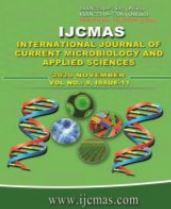


 National Academy of Agricultural Sciences (NAAS)
National Academy of Agricultural Sciences (NAAS)

|
PRINT ISSN : 2319-7692
Online ISSN : 2319-7706 Issues : 12 per year Publisher : Excellent Publishers Email : editorijcmas@gmail.com / submit@ijcmas.com Editor-in-chief: Dr.M.Prakash Index Copernicus ICV 2018: 95.39 NAAS RATING 2020: 5.38 |
Field experiment was conducted at Department of Agronomy, College of Agriculture, UAS, Raichur to study the “Evaluation of non-chemical eco-friendly weed management approaches in HDPS cotton” during the year of 2017-18 and 2018-19. The experiment was laid out in Randomized Completely Block Design with three replications. There were 14 treatments imposed viz., polythene mulch, paddy straw mulch, cotton stalk mulch, intercropping with green manures at 1:1 ratio (Sunnhemp and Cowpea), four different botanicals extracts @ 20% as PE (Eucalyptus sp., Prosopis juliflora extract, Cassia tora and Parthenium hysterophorus), mechanical, cultural and their combination compared with weed free check, unweeded control and recommended practice. The two years pooled data results registered that, weed free check has recorded significantly greater seed cotton yield (1372 kg ha-1) over rest of the treatments. It was followed by Cotton + Sunnhemp (1:1) subsequently in-situ mulching at 45 DAS (1299 kg ha-1), pendimethalin 38.7 CS @ 680 g a.i./ha as PE fb pyrithiobac sodium 10 EC 75 g a.i./ha + quizolofop ethyl 37.5 g a.i./ha at 25 DAS as PoE (1274 kg ha-1) and black polythene sheet mulch (1262 kg ha-1 ). These treatments also recorded lower weed density at 50 DAS (4.9, 4.0 and 5.3 respectively), weed dry weight m-2 at 50 DAS (5.5, 4.9 and 5.7, respectively), weed control efficiency at 75 DAS (77.2, 81.2 and 75.3, respectively), weed index (4.60, 6.30 and 7.20, respectively), number of sympodials plant-2 at harvest (15.8, 17.7 and 15.2), number of bolls plant-2 at harvest (16.4, 16.7 and 16.3, respectively), net returns (Rs.52284, 49613 and 42825 ha-1 ) and BC ratio (3.3, 3.0 and 2.4, respectively). The eco-friendly treatments viz., cotton + Sunnhemp (1:1) and in-situ mulching at 45 DAS, mulching with black polythene sheet, Cotton + Cowpea (1:1) and in-situ mulching at 45 DAS were at par with weed free check and they might be recommended as these were the best options.
 |
 |
 |
 |
 |